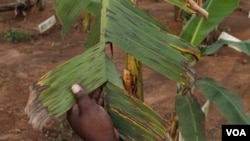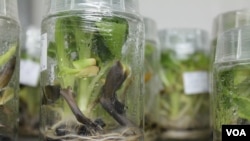KAMPALA —
Uganda is poised to introduce genetically modified organisms as parliament considers a bill to regulate them. The modified crops could be the answer to devastating diseases like banana wilt. But the issue has been highly controversial.
On a small, tidy banana plantation just outside Kampala, Andrew Kiggundu walked among the plants turning over leaves. The plot was lush and green, but still, he did not like what he saw.
“The disease on the leaves you see right now is not the wilt, it is a different disease called black sigatoka. It is just killing off the leaves and causing significant yield loss," he said. "This is a big problem, although of course not as much as the wilt, because the wilt just destroys the whole plant.”
Kiggundu works with the National Agricultural Research Organization (NARO), an Ugandan government agency developing genetically modified bananas. The new plants are meant to be resistant to black sigatoka and banana bacterial wilt, which has been wiping out vast swaths of the country’s crop.
Uganda is the world’s number one consumer of bananas, a staple in terms of food security. NARO Research Director Wilberforce Tushemereirwe said this is why it is so important to produce healthy plants.
“The disease keeps on moving around wiping out garden after garden, so you will go to areas where you find they have changed from banana to annual crops," he said. "That has already introduced food insecurity, because they are not used to handling annual crops.”
Uganda already allows trials of genetically modified organisms and a Biotechnology and Biosafety Bill before parliament would set the legal stage for their development and distribution.
But the issue has created a firestorm among Ugandan activists, with many claiming genetically modified organisms would be dangerous to human health, the environment and the livelihoods of small-scale farmers.
Giregon Olupot, a soil biophysicist at Kampala’s Makerere University, has been an outspoken critic of the technology.
“There are a range of options that risk to be wiped [out], just by this technology," said Olupot. "With bananas, tissue culture has worked well to engineer healthy plants. You then take these plants to a clean garden and maintain field hygiene. Why are we not giving emphasis to that technology?”
Most genetically modified seeds are patented, requiring farmers to re-purchase them after each planting. This might work for commercial farmers, said Olupot, but Uganda’s subsistence farmers relied on their own seeds. Marketing genetically modified organisms to them could mean trapping them in a system they could not afford, he said.
“If you are to go commercial, it has to be on a large scale. Now the farmers we are talking about, on average, have 0.4 hectares of land. It is simply not suitable for our farmers,” said Olupot.
Uganda’s genetically modified bananas are being developed by a public institution, and NARO said no patent restrictions would apply to them. But Olupot said this would probably not be the case with future genetically modified crops introduced to Uganda.
Anti-GMO campaigners have been diligent in spreading their message, remarked Kiggundu, and many farmers were now afraid of genetically modified organisms.
“They are, because of course they have heard a lot of bad things about them from those who are trying to de-campaign the technology. And for the few times that I have been out there and able to tell them the truth, you could see second thoughts. That sort of response tells you that they have maybe a preconceived idea,” he said.
The Biotechnology and Biosafety Bill is expected to pass before the end of the year. But Olupot insisted that if a referendum on genetically modified organisms were held today among Ugandan farmers, the response would be an overwhelming “no.”
On a small, tidy banana plantation just outside Kampala, Andrew Kiggundu walked among the plants turning over leaves. The plot was lush and green, but still, he did not like what he saw.
“The disease on the leaves you see right now is not the wilt, it is a different disease called black sigatoka. It is just killing off the leaves and causing significant yield loss," he said. "This is a big problem, although of course not as much as the wilt, because the wilt just destroys the whole plant.”
Kiggundu works with the National Agricultural Research Organization (NARO), an Ugandan government agency developing genetically modified bananas. The new plants are meant to be resistant to black sigatoka and banana bacterial wilt, which has been wiping out vast swaths of the country’s crop.
Uganda is the world’s number one consumer of bananas, a staple in terms of food security. NARO Research Director Wilberforce Tushemereirwe said this is why it is so important to produce healthy plants.
“The disease keeps on moving around wiping out garden after garden, so you will go to areas where you find they have changed from banana to annual crops," he said. "That has already introduced food insecurity, because they are not used to handling annual crops.”
Uganda already allows trials of genetically modified organisms and a Biotechnology and Biosafety Bill before parliament would set the legal stage for their development and distribution.
But the issue has created a firestorm among Ugandan activists, with many claiming genetically modified organisms would be dangerous to human health, the environment and the livelihoods of small-scale farmers.
Giregon Olupot, a soil biophysicist at Kampala’s Makerere University, has been an outspoken critic of the technology.
“There are a range of options that risk to be wiped [out], just by this technology," said Olupot. "With bananas, tissue culture has worked well to engineer healthy plants. You then take these plants to a clean garden and maintain field hygiene. Why are we not giving emphasis to that technology?”
Most genetically modified seeds are patented, requiring farmers to re-purchase them after each planting. This might work for commercial farmers, said Olupot, but Uganda’s subsistence farmers relied on their own seeds. Marketing genetically modified organisms to them could mean trapping them in a system they could not afford, he said.
“If you are to go commercial, it has to be on a large scale. Now the farmers we are talking about, on average, have 0.4 hectares of land. It is simply not suitable for our farmers,” said Olupot.
Uganda’s genetically modified bananas are being developed by a public institution, and NARO said no patent restrictions would apply to them. But Olupot said this would probably not be the case with future genetically modified crops introduced to Uganda.
Anti-GMO campaigners have been diligent in spreading their message, remarked Kiggundu, and many farmers were now afraid of genetically modified organisms.
“They are, because of course they have heard a lot of bad things about them from those who are trying to de-campaign the technology. And for the few times that I have been out there and able to tell them the truth, you could see second thoughts. That sort of response tells you that they have maybe a preconceived idea,” he said.
The Biotechnology and Biosafety Bill is expected to pass before the end of the year. But Olupot insisted that if a referendum on genetically modified organisms were held today among Ugandan farmers, the response would be an overwhelming “no.”





